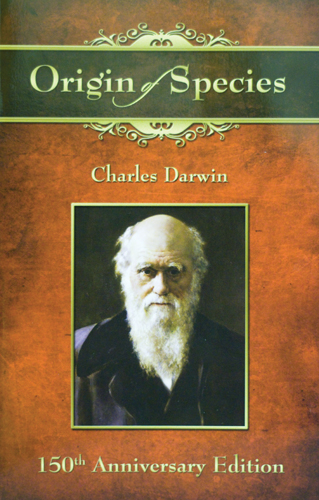ASHLEIGH MATTERN
Editor-in-Chief
Students who get a free copy of Darwin’s On the Origin of Species this month might be surprised to find an introduction by intelligent design proponent Ray Comfort.
Comfort and his ministry Living Waters are targeting North American universities during November to give “future doctors, lawyers and politicians”¦ information about Intelligent Design,” reads their website. Intelligent design and creationism are beliefs opposed to Darwinian evolution, positing that a supernatural creator set life in motion.

On Nov. 9, an unknown group handed out several copies to passers-by in front of Place Riel. Steve Newton, program director of the website “Don’t Diss Darwin” from the National Center for Science Education in California, said most of the work handing out copies is being done by volunteers and in some schools with the help of Campus for Christ. The books have also been handed out at the University of Alberta.
The U of S chapter of Campus for Christ said they were unaware of the event and had not read the introduction, so were unable to comment.
Torien Cafferata, president of the University of Saskatchewan Freethought Alliance, a campus group for scientific integrity and secularism, says he is concerned about the way in which the books were handed out, saying it was done “in a weasely kind of way.” Newton said Comfort and supporters plan to distribute the books to 100 American universities on Nov. 19, and 24 Canadian universities on Nov. 24, the 150th anniversary of the first publication of the book.
Cafferata says he thinks they may have changed their plans due to pressure from secularist societies like the Freethought Alliance.
“They learned that a lot of secularist societies were planning a counteroffensive, like to celebrate evolution on that day. We were planning to find out where they were planning to release the book then we would set up next to them and have all the supportive facts for evolution.”
Dr. Jose Andrés, an evolutionary biologist at the U of S, says that one of his issues with the introduction is that it’s inappropriate for the scientific topic of the book.
The introduction talks about religion and “Solving life’s more important questions,” but Andrés points out, “all of that has nothing to do, absolutely nothing to do, with the Origin of Species or with any biological textbook.”
“It’s fine by me, and I’m happy to read that as the introduction to a religious book, but not as the introduction to a piece of work that has to do with science.”
There are two versions of the book circulating. In an open letter from Comfort on the Living Waters website, he says, “My name will be on the cover (for those who think that we are somehow being deceptive),” but his name appears nowhere on the back or front cover on a copy obtained by the Sheaf. The version handed out at the U of S is an older version, which Newton says has several chapters of Darwin’s original text removed and a slightly different introduction.
Joseph Anderson, an employee at Kenderdine Gallery, happened to pick up a free copy. Having always wanted to read On the Origin of Species, Anderson said he was excited to get the free copy but said it surprised him to find out the introduction was written by a creationist.
“Just because the Origin of Species by Darwin has sort of been held up as an anti-Christian kind of book for so long, I was surprised it was being used as a missionary tool,” he said.
Still, he says compared to some of the religious groups he has encountered on campus, the people handing out the books were innocuous.
“I actually have a really strong religious background, though not so much anymore,” said Anderson. “So I don’t know, the way they went about it seems a gentle approach, which I appreciate. I’m not for banning groups from campus or anything like that.”
University of Saskatchewan Students’ Union president Warren Kirkland echoed Anderson’s sentiments, saying anyone can hand things out on campus and as long as they’re being respectful and no one has complained, it isn’t an issue.
“The university is about embracing different views and thoughts,” Kirkland said.
In the end, Cafferata says he’s most worried about the students who pick up the book and think Comfort has a valid argument against evolution.
Robert Luhn, director of communications for the National Center for Science Education, agrees, saying the introduction has “bad science, bad history and bad theology.”
“The telling points being that it’s not just a matter of, gosh, Ray Comfort doesn’t know anything about science,” Luhn said. “He makes completely spurious claims. There’s not transitional fossils? There are transitional fossils in museums all over the world!”
Leave a Reply